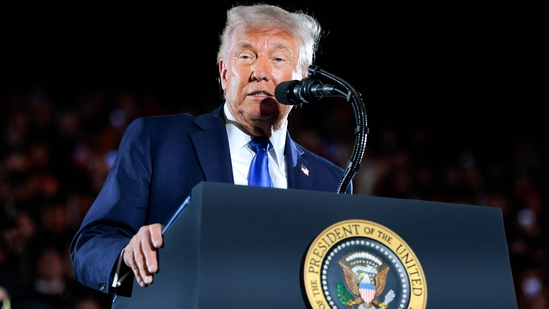100% Tariffs on China Send a Stark Warning to India: No U.S. Trade Deal Is Truly Permanent

TUSCALOOSA, ALABAMA - MAY 01: U.S. President Donald Trump delivers remarks to graduating students at the Coleman Coliseum at the University of Alabama on May 01, 2025 in Tuscaloosa, Alabama. Trump's remarks come the day before commencement ceremonies. Anna Moneymaker/Getty Images/AFP (Photo by Anna Moneymaker / GETTY IMAGES NORTH AMERICA / Getty Images via AFP)
A recent report from the Global Trade Research Institute (GTRI) warns that India must approach its trade negotiations with the United States with caution, especially in light of Donald Trump’s decision to impose 100% additional tariffs on goods from China. The move, which may take effect from November 1 (or earlier), signals a deeper problem: under the current U.S. administration, trade deals cannot be assumed stable or final.
Key Points from the Report
- Unpredictability of U.S. Trade Policy
The sudden tariff escalation against China underscores how rapidly U.S. trade policy can change. What seemed like a settled “Phase One” agreement between the U.S. and China—where duties were capped—has now been upended by sweeping new measures. For India, this serves as a stark reminder that even a signed agreement with Washington may not endure. - Pressure to Bolster Self-Reliance
GTRI argues India should reduce dependence on external markets and shift focus toward greater economic resilience. Rather than relying on U.S. commitments, New Delhi should deepen capabilities in critical sectors like rare-earth minerals, electronics, and defence technologies to buffer against external shocks. - Negotiating from Strength, Not Need
In future US–India talks, GTRI urges India to demand reciprocity and to insist on stable, enforceable terms—rather than ceding flexibility in policy later. The institute suggests that India’s bargaining position must reflect strategic autonomy, not desperation. - Wider Economic Fallout
The tariff shock is expected to reverberate across global supply chains. Industries such as electric vehicles, wind turbines, and semiconductors may see price hikes, while countries involved in rare-earth production and technology supply lines could realign trade alliances. India, straddling ties with both the U.S. and China, is especially vulnerable to these shifts.






